| Listing 1 - 7 of 7 |
Sort by
|
Book
ISBN: 0521499135 Year: 2003 Publisher: Cambridge Cambridge University press
Abstract | Keywords | Export | Availability | Bookmark
 Loading...
Loading...Choose an application
- Reference Manager
- EndNote
- RefWorks (Direct export to RefWorks)
534.1 --- 534.8 --- 519.63 --- #KVIV:BB --- 519.63 Numerical methods for solution of partial differential equations --- Numerical methods for solution of partial differential equations --- 534.8 Applications of acoustics (theory) --- Applications of acoustics (theory) --- 534.1 Vibration of bodies. Excitation of vibrations. Vibratory formations with distributed mass and elasticity --- Vibration of bodies. Excitation of vibrations. Vibratory formations with distributed mass and elasticity

ISBN: 3540017720 9783540017721 3540887059 3540887067 Year: 2003 Volume: 45 Publisher: Berlin Springer
Abstract | Keywords | Export | Availability | Bookmark
 Loading...
Loading...Choose an application
- Reference Manager
- EndNote
- RefWorks (Direct export to RefWorks)
The book is suitable for advanced undergraduate and beginning graduate students of applied mathematics and engineering. The main theme is the integration of the theory of linear PDEs and the numerical solution of such equations. For each type of PDE, elliptic, parabolic, and hyperbolic, the text contains one chapter on the mathematical theory of the differential equation, followed by one chapter on finite difference methods and one on finite element methods. As preparation, the two-point boundary value problem and the initial-value problem for ODEs are discussed in separate chapters. There is also one chapter on the elliptic eigenvalue problem and eigenfunction expansion. The presentation does not presume a deep knowledge of mathematical and functional analysis. Some background on linear functional analysis and Sobolev spaces, and also on numerical linear algebra, is reviewed in two appendices.
Numerical solutions of differential equations --- Differential equations, Partial --- Equations aux dérivées partielles --- Numerical solutions --- Solutions numériques --- 519.63 --- -Partial differential equations --- Numerical methods for solution of partial differential equations --- Numerical solutions. --- -Numerical methods for solution of partial differential equations --- -519.63 Numerical methods for solution of partial differential equations --- Partial differential equations --- Equations aux dérivées partielles --- Solutions numériques --- 519.63 Numerical methods for solution of partial differential equations --- Numerical analysis --- Mathematical analysis. --- Analysis (Mathematics). --- Numerical analysis. --- Partial differential equations. --- Analysis. --- Numerical Analysis. --- Partial Differential Equations. --- Mathematical analysis --- 517.1 Mathematical analysis --- Differential equations, Partial - Numerical solutions
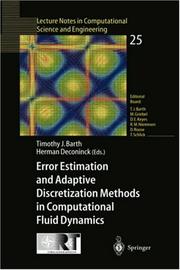
ISBN: 3540437584 3642078419 3662051893 9783662051894 Year: 2003 Publisher: Berlin : Springer,
Abstract | Keywords | Export | Availability | Bookmark
 Loading...
Loading...Choose an application
- Reference Manager
- EndNote
- RefWorks (Direct export to RefWorks)
This book considers recent developments in numerical error estimation and adaptive discretization for finite element and finite volume methods with particular attention given to discretization methods used frequently in computational fluid dynamics. The volume consists of six detailed articles by leading specialists covering a range of topics including a posteriori error estimation of functionals, one- and two-sided error bounds, error indicators for ad aptivity, and nd geometrical aspects of adaptive mesh refinement. This book should be of interest to readers actively working in the field as well as readers seeking a comprehensive introduction to the topic.
Finite element method. --- Fluid dynamics --- Numerical analysis. --- Mathematics. --- 519.63 --- Computer science --- Engineering --- Construction --- Industrial arts --- Technology --- Computer mathematics --- Electronic data processing --- Mathematics --- 519.63 Numerical methods for solution of partial differential equations --- Numerical methods for solution of partial differential equations --- Computer mathematics. --- Mathematical physics. --- Fluids. --- Computational intelligence. --- Computational Mathematics and Numerical Analysis. --- Theoretical, Mathematical and Computational Physics. --- Fluid- and Aerodynamics. --- Computational Intelligence. --- Intelligence, Computational --- Artificial intelligence --- Soft computing --- Hydraulics --- Mechanics --- Physics --- Hydrostatics --- Permeability --- Physical mathematics --- Mathematiques --- Mecanique des fluides
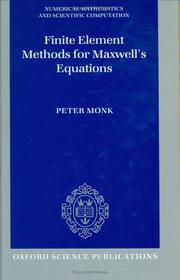
ISBN: 0198508883 9780198508885 Year: 2003 Publisher: Oxford : Oxford University Press,
Abstract | Keywords | Export | Availability | Bookmark
 Loading...
Loading...Choose an application
- Reference Manager
- EndNote
- RefWorks (Direct export to RefWorks)
Comprehensive treatment of edge finite element methods Variational theory of Maxwell's equations Error analysis of finite element methods Background material in functional analysis and Sobolev space theory Introduction to inverse problems Since the middle of the last century, computing power has increased sufficiently that the direct numerical approximation of Maxwell's equations is now an increasingly important tool in science and engineering. Parallel to the increasing use of numerical methods in computational electromagnetism there has also been considerable progress in the mathematical understanding of the properties of Maxwell's equations relevant to numerical analysis. The aim of this book is to provide an up to date and sound theoretical foundation for finite element methods in computational electromagnetism. The emphasis is on finite element methods for scattering problems that involve the solution of Maxwell's equations on infinite domains. Suitable variational formulations are developed and justified mathematically. An error analysis of edge finite element methods that are particularly well suited to Maxwell's equations is the main focus of the book. The methods are justified for Lipschitz polyhedral domains that can cause strong singularities in the solution. The book finishes with a short introduction to inverse problems in electromagnetism.
535.13 --- 535.13 Electromagnetic theory (Maxwell) --- Electromagnetic theory (Maxwell) --- finite element method --- computer-aided engineering --- CAE (computer aided engineering) --- Maxwell equations --- Electromagnétisme --- Equations de Maxwell --- Partitial differential equations: domain decomposition methods; elliptic equations; finite difference methods; finite element methods; finite volume methods; hyperbolic equations; inverse problems; iterative solution techniques; methods of lines; multigrid and multilevel methods; parabolic equations; special methods --- Maxwell equations. --- Electromagnétisme --- Electromagnetism --- Finite element method --- Electromagnetics --- Magnetic induction --- Magnetism --- Metamaterials --- Equations, Maxwell --- Differential equations, Partial --- Electromagnetic theory --- FEA (Numerical analysis) --- FEM (Numerical analysis) --- Finite element analysis --- Numerical analysis --- Isogeometric analysis --- Mathematical models --- 519.63 --- 681.3*G18 --- 519.63 Numerical methods for solution of partial differential equations --- Numerical methods for solution of partial differential equations --- Numerical solutions of differential equations --- Functional analysis --- eindige elementen --- Finite element method. --- Mathematical models. --- Méthode des éléments finis --- Modèles mathématiques --- Electromagnetism - Mathematical models --- Equations aux derivees partielles --- Equations de maxwell --- Methodes numeriques --- Elements finis
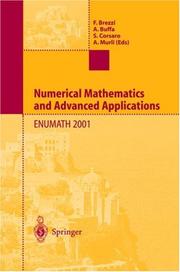
ISBN: 8847001803 8847021677 8847020891 Year: 2003 Publisher: Milano Springer
Abstract | Keywords | Export | Availability | Bookmark
 Loading...
Loading...Choose an application
- Reference Manager
- EndNote
- RefWorks (Direct export to RefWorks)
Scientific computing is a fast growing and fast changing area whose applications to various branches of science, engineering, medicine, economics (and others) are increasing in number and relevance every day. There are two main reasons (among others) that make scientific computing change so rapidly. One is the increasing number of different research areas beginning to make use of numerical simulation: from nanotechnology to genomics, from computer aided diagnosis and operations in medical applications (which involve often com plete simulations of parts of the human body) to economics and finance. Each new application, and each new aspect of earlier applications, draws heavily on the know how that has been acquired on other problems with similar mathematical features. It has to be pointed out that the lofty perspective of mathematics succeeds quite often in finding connections among very different phenomena, that tum out in the end to share the same mathematical and numerical structure. In tum, new applica tions contribute to the cross-fertilization by "sending back" new interpretations and suggestions which are often useful in more classical applications. All this creates a resonance effect that contributes greatly to the growth rate of the whole field.
519.6 <063> --- 519.62 <063> --- 519.63 <063> --- 681.3*G17 <063> --- 681.3*G18 <063> --- 681.3*G18 <063> Partial differential equations: difference methods; elliptic equations; finite element methods; hyperbolic equations; method of lines; parabolic equations (Numerical analysis)--Congressen --- Partial differential equations: difference methods; elliptic equations; finite element methods; hyperbolic equations; method of lines; parabolic equations (Numerical analysis)--Congressen --- 681.3*G17 <063> Ordinary differential equations: boundary value problems; convergence and stability; error analysis; initial value problems; multistep methods; single step methods; stiff equations (Numerical analysis)--Congressen --- Ordinary differential equations: boundary value problems; convergence and stability; error analysis; initial value problems; multistep methods; single step methods; stiff equations (Numerical analysis)--Congressen --- 519.63 <063> Numerical methods for solution of partial differential equations--Congressen --- Numerical methods for solution of partial differential equations--Congressen --- 519.62 <063> Numerical methods for solution of ordinary differential equations--Congressen --- Numerical methods for solution of ordinary differential equations--Congressen --- 519.6 <063> Computational mathematics. Numerical analysis. Computer programming--Congressen --- Computational mathematics. Numerical analysis. Computer programming--Congressen --- Mathematical analysis. --- Analysis (Mathematics). --- Applied mathematics. --- Engineering mathematics. --- Computer mathematics. --- Analysis. --- Applications of Mathematics. --- Computational Mathematics and Numerical Analysis. --- Computer mathematics --- Electronic data processing --- Mathematics --- Engineering --- Engineering analysis --- Mathematical analysis --- 517.1 Mathematical analysis
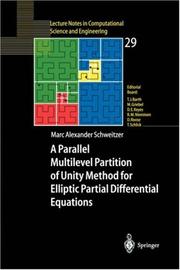
ISBN: 3540003517 3642593259 Year: 2003 Publisher: Berlin Springer
Abstract | Keywords | Export | Availability | Bookmark
 Loading...
Loading...Choose an application
- Reference Manager
- EndNote
- RefWorks (Direct export to RefWorks)
The numerical treatment of partial differential equations with meshfree discretization techniques has been a very active research area in recent years. Up to now, however, meshfree methods have been in an early experimental stage and were not competitive due to the lack of efficient iterative solvers and numerical quadrature. This volume now presents an efficient parallel implementation of a meshfree method, namely the partition of unity method (PUM). A general numerical integration scheme is presented for the efficient assembly of the stiffness matrix as well as an optimal multilevel solver for the arising linear system. Furthermore, detailed information on the parallel implementation of the method on distributed memory computers is provided and numerical results are presented in two and three space dimensions with linear, higher order and augmented approximation spaces with up to 42 million degrees of freedom.
Differential equations, Elliptic --- Partition of unity method. --- Numerical solutions --- Data processing. --- -681.3*G18 --- 519.63 --- Partition of unity method --- PUM (Numerical analysis) --- Meshfree methods (Numerical analysis) --- 519.63 Numerical methods for solution of partial differential equations --- Numerical methods for solution of partial differential equations --- 681.3 *G18 Partial differential equations: difference methods; elliptic equations; finite element methods; hyperbolic equations; method of lines; parabolic equations (Numerical analysis) --- Partial differential equations: difference methods; elliptic equations; finite element methods; hyperbolic equations; method of lines; parabolic equations (Numerical analysis) --- Elliptic differential equations --- Elliptic partial differential equations --- Linear elliptic differential equations --- Differential equations, Linear --- Differential equations, Partial --- -Data processing --- 681.3*G18 --- Numerical solutions&delete& --- Data processing --- 681.3 *G18 --- Mathematical analysis. --- Analysis (Mathematics). --- Computer mathematics. --- Physics. --- Partial differential equations. --- Applied mathematics. --- Engineering mathematics. --- Analysis. --- Computational Mathematics and Numerical Analysis. --- Numerical and Computational Physics, Simulation. --- Partial Differential Equations. --- Mathematical and Computational Engineering. --- Engineering --- Engineering analysis --- Mathematical analysis --- Partial differential equations --- Natural philosophy --- Philosophy, Natural --- Physical sciences --- Dynamics --- Computer mathematics --- Electronic data processing --- Mathematics --- 517.1 Mathematical analysis
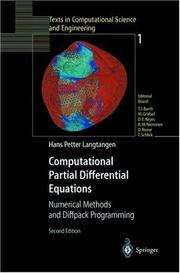
ISBN: 354043416X 3642628117 3642557694 9783540434160 Year: 2003 Publisher: Berlin Springer
Abstract | Keywords | Export | Availability | Bookmark
 Loading...
Loading...Choose an application
- Reference Manager
- EndNote
- RefWorks (Direct export to RefWorks)
The second edition features lots of improvements and new material. The most significant additions include - finite difference methods and implementations for a 1D time-dependent heat equation (Chapter 1. 7. 6), - a solver for vibration of elastic structures (Chapter 5. 1. 6), - a step-by-step instruction of how to develop and test Diffpack programs for a physical application (Chapters 3. 6 and 3. 13), - construction of non-trivial grids using super elements (Chapters 3. 5. 4, 3. 6. 4, and 3. 13. 4), - additional material on local mesh refinements (Chapter 3. 7), - coupling of Diffpack with other types of software (Appendix B. 3) - high-level programming offinite difference solvers utilizing the new stencil (finite difference operator) concept in Diffpack (Appendix D. 8). Many of the examples, projects, and exercises from the first edition have been revised and improved. Some new exercises and projects have also been added. A hopefully very useful new feature is the compact overview of all the program examples in the book and the associated software files, presented in Chapter 1. 2. Errors have been corrected, many explanations have been extended, and the text has been upgraded to be compatible with Diffpack version 4. 0. The major difficulty when developing programs for numerical solution of partial differential equations is to debug and verify the implementation. This requires an interplay between understanding the mathematical model,the in volved numerics, and the programming tools.
Differential equations, Partial --- Numerical solutions --- Data processing. --- Diffpack (Computer file). --- 681.3 *G18 --- 519.63 --- 519.63 Numerical methods for solution of partial differential equations --- Numerical methods for solution of partial differential equations --- 681.3 *G18 Partial differential equations: difference methods; elliptic equations; finite element methods; hyperbolic equations; method of lines; parabolic equations (Numerical analysis) --- Partial differential equations: difference methods; elliptic equations; finite element methods; hyperbolic equations; method of lines; parabolic equations (Numerical analysis) --- Partial differential equations --- Numerical solutions&delete& --- Data processing --- Diffpack (Computer file) --- Computers. --- Mathematical analysis. --- Analysis (Mathematics). --- Software engineering. --- Computer mathematics. --- Computational intelligence. --- Mathematical physics. --- Theory of Computation. --- Analysis. --- Software Engineering/Programming and Operating Systems. --- Computational Mathematics and Numerical Analysis. --- Computational Intelligence. --- Theoretical, Mathematical and Computational Physics. --- Physical mathematics --- Physics --- Intelligence, Computational --- Artificial intelligence --- Soft computing --- Computer mathematics --- Electronic data processing --- Mathematics --- Computer software engineering --- Engineering --- 517.1 Mathematical analysis --- Mathematical analysis --- Automatic computers --- Automatic data processors --- Computer hardware --- Computing machines (Computers) --- Electronic brains --- Electronic calculating-machines --- Electronic computers --- Hardware, Computer --- Computer systems --- Cybernetics --- Machine theory --- Calculators --- Cyberspace
| Listing 1 - 7 of 7 |
Sort by
|

 Search
Search Feedback
Feedback About
About Help
Help News
News